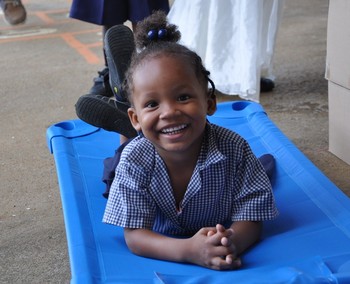Site will be
unavailable for maintenance from June. 4, 11:30 p.m., to June 5, 12:30 a.m. ET. Thank you for your
patience!
ChildFund to Complete Work in the Caribbean This Summer
By Lynda Perry, Staff Writer Posted on 03/17/2013

A child enrolled in a ChildFund-supported preschool in Dominica.
This summer, after more than four decades in the region, ChildFund will close our two remaining offices in the Caribbean. Both — one in Dominica and the other in St. Vincent and the Grenadines — will end operations by July 31, 2016.
Although the work is far from over, we leave behind two local agencies bolstered by years of ChildFund training and development, each dedicated to continuing programs for children and families. Because of our work and that of our local partners, we also leave behind strengthened communities more committed to children’s rights and more able to protect and nurture childhoods.
Our investment in the Caribbean has created significant, lasting change — particularly in the realm of early childhood development, which is key because the fundamental stage of early childhood is when we have the best chance of intervening to help children overcome challenges and attain success later in life.
Perhaps the region’s greatest accomplishment has been to achieve universal early childhood education: Every child in Dominica between 3 and 5 years old now must receive a high-quality preschool education, thanks to years of advocacy work by ChildFund and others. Our leadership in the National Early Childhood Development Council — and that of UNICEF, the Bernard van Leer Foundation and the Foundation for the Development of Caribbean Children — has helped transform early childhood for the children of Dominica. Preschools now must be licensed and certified to assure quality standards are met and children are well-protected. Moreover, all preschools teach the acclaimed HighScope Curriculum that we championed. HighScope’s child-centered, active learning curriculum is proven to achieve long-term gains in the social, intellectual and physical development of young children.
Our success running the Roving Caregiver Program has led the Dominican government to place early childhood development on the national agenda and to take steps toward institutionalizing the program — truly transforming the way the region supports children. The program provides home- and community-based training and coaching to parents and caregivers of young children and has created significantly greater numbers of children who arrive in primary school healthy and ready to learn. As a result, the government has partnered with the Bernard van Leer Foundation, the National Bank of Dominica, the Foundation for the Development of Caribbean Children and the Caribbean Internship Program in hopes of continuing the work. Other islands that have studied ChildFund’s experience with the Roving Caregiver Program now operate the program as well. Belize has replicated the program also, having studied its use in Dominica.
Apart from early childhood, the region has achieved other long-term gains since ChildFund began working there. In the health sector, more than 90 percent of the people in Dominica and St. Vincent received immunizations by the end of 2015, compared to rates of 65 percent and 26 percent, respectively, in 1980. In education, ChildFund advanced the use of quality curricula and resources in more than 70 primary schools and provided specialized education consultants. In child protection, we introduced the Child Assault Prevention (CAP) program that teaches school-aged children to protect themselves from bullies and predators. Our partnership in longstanding advocacy work has raised awareness of the need to protect children from physical and sexual abuse.
Beyond our work to improve the lives of children and families in the region over the long term, ChildFund has responded quickly when emergency strikes. Most recently, in the devastation that followed Tropical Storm Erika last year, our Roving Caregivers Program worked unstintingly to restore normalcy to the lives of displaced children. We established and operated child-centered spaces in schools and community centers that provided care and protection to affected children, along with a chance to participate in sports, creative arts, free play and studies. In partnership with UNICEF, the Welfare Division and the Ministry of Education, we administered the "Return to Happiness" program to help children cope with disaster through a series of play activities designed to help them process their experiences, release anxiety and re-establish a sense of security.
In our work for children around the world, ChildFund’s ultimate goal is to leave behind communities that are committed to children’s rights and well-being, and able to sustain programs that benefit children and families. That’s why we commit so many resources toward building relationships and collaborating with local agencies, advocating for children’s rights to governments, and training professionals and volunteers who work with children and families.
While we are sad to say goodbye to the region and our individual relationships with the children enrolled in our programs, we know we leave behind parents who are better able to raise children into independent, productive adults; teachers and child care practitioners with the skills to deliver high-quality educations; and young people who are graduating from school and training programs much better equipped to support themselves and contribute to positive, lasting change in their communities and beyond. Most importantly, we leave behind stronger communities that are committed — and better able — to do what is best for children.
Loading...

